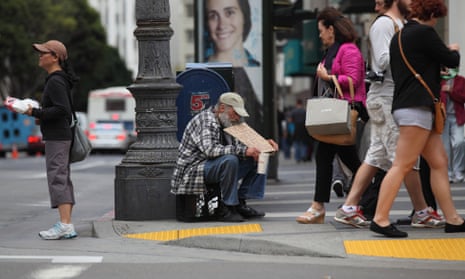On any given night, 50,000 of our nation’s veterans are without a safe place to sleep. As First Lady Michelle Obama said: “When a Veteran comes home kissing the ground, it is unacceptable that he should ever have to sleep on it.”
In New Orleans, we have proven it doesn’t have to be this way by becoming the first major city in America to end veteran homelessness. And, in doing so, we developed a model that will not only help other cities end veteran homelessness, but can also guide our efforts in tackling the issues that face this nation’s large homeless population.
Immediately after Hurricane Katrina, many of us knew what it felt like to be homeless. In fact, we had more than 11,600 homeless residents in the years after the storm (that number is now down to less than 2,000). That’s why one of my top priorities as mayor has been to help all the residents of our city who, for whatever reason, now find themselves on the streets – and especially our veterans, by whom we can all do better.
We took up the charge to be the first major city in America to complete First Lady Michelle Obama’s Mayors Challenge to End Veteran Homeless by the end of 2015 – and that’s precisely what we did.
In January 2015, New Orleans became the first major city in America to end homelessness among veterans – a full year ahead of the national goal. It was an extraordinary moment, but it took time, hard work, perseverance and all of us working together with partners at every level to get the job done. We also realized that the sheer amount of work required to help such a small percentage of our city’s homeless population makes clear how much we still have to do to help all of our homeless residents who need and deserve roofs over their heads.
To end veteran homelessness in New Orleans, we first had to identify and locate each homeless veteran living in our city. According to the Department of Housing and Urban Development (HUD), there were nearly 200 homeless veterans living on our streets or in shelters on any given night in 2014. Using that information as a starting point, experienced outreach teams then combed New Orleans looking for them. We also organized a special push over the course of five nights last fall when about 150 active duty military personnel and veterans joined the effort to systematically seek and engage every homeless veteran. Many of these same service members and veterans would later help move their homeless brothers and sisters in arms into their new homes.
From there, the Department of Veteran Affairs, HUD, nonprofits, our city’s housing authority and countless others all pitched in to help. Through these combined efforts, 227 homeless veterans in New Orleans were permanently housed as a part of the Mayors Challenge – far more than we originally identified.
The work of ending veteran homelessness never really ends, though. That’s why we not only housed all the homeless veterans we could locate in New Orleans, but we also created a new, sustainable and rapid-response outreach model. Since fulfilling the Mayors Challenge in January, New Orleans has housed an additional 42 veterans and we are meeting our goal of housing them within an average of 30 days. Now, when a veteran does become homeless in the city of New Orleans, this homelessness will be rare, brief and nonrecurring.
To date, 432 mayors, seven governors and 131 other local officials across the nation have accepted the challenge to end veteran homelessness. We hope that our work in New Orleans on the front end of this effort can inspire and guide these cities as they seek to replicate our success. And, we, as a city, are more motivated than ever to tackle the issue of homelessness across our community so that every New Orleanian – and eventually every American – has the opportunity to live a long, happy and healthy life.
